China Cycling Travelogues
Do you have a China cycling travelogue you would like to share here?
Contact us for details.
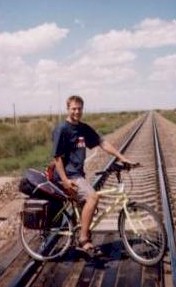
"May Day, May Day!"
A crash course in Mongolian meteorology
By Jonathan Litton
Copyright © Jonathan Litton, 2006
Mission Statement
"What will you do in the holidays?" I asked a colleague.
"I will stay at home and not go out." It was the textbook response. "And you?"
"I'll eat lots of biscuits and think about life," said I, neglecting to mention that my planned place of feasting and philosophising would be deep in the Inner Mongolian steppe.
Welcome to China during the SARS period. In a country difficult to understand at the best of times, confusion, chaos and cancellations reigned supreme during this little episode. A cynic might quip "no change there then" ?but even he couldn't deny that the mobilisation of a few million masks and thermometers was a pretty big project, and that the undertakers had rather a large undertaking to boot. Whilst everyone who experienced these trying times probably has a tale or two to tell, I'm willing to bet not too many of these folk attempted to circumnavigate China's fifth largest lake by bike. Those who did will know about the perils such an adventure entailed: sunburn, hypothermia, run-ins with the local constabulary, evil dogs intent on infecting foreign cyclists, doctors equally intent on disinfecting them, road blocks, border security and irate yet uncontactable school authorities. For those who didn't, allow me to explain.
Escape and Evasion
I almost never made it. The day before my bolt to the border there had been a break-in to my apartment, and my American colleague had been relieved of his laptop and wallet. These were big losses; the type which could not just be written off but which warranted a police investigation. David was served not by mere junior constables but by the District Chiefs of the Harbin police force. I sensed trouble. The investigation was ludicrously lavish despite the fact that there was hardly a hope of catching the culprit. I knew that they? be fingerprinting, and I knew that they'd need my inky paw-prints in order to distinguish between incidental marks and those from the criminal. I only hoped they wouldn't take too much time, as I had a train to catch. Annoyingly, they set about doing a complete reconstruction of the break-in, despite the fact that such knowledge would not elicit any clues as to the identity of the thief or the whereabouts stolen goods. But it would look like a job well done in a report, and so it was. They finally took my prints and then I joined the robber in doing a runner ?my bike had already been bundled on a train bound for the Russian border and I had every intention of following it.
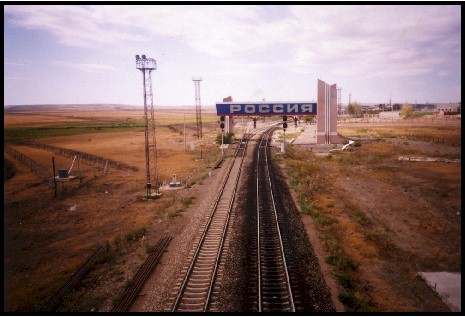
Gateway to Russia
And so I found myself heading northwest on the Trans Manchurian railway, a line that runs all the way from Beijing to Moscow. My destination was Manzhouli, right on the border with Siberia and deep in the Inner Mongolian steppe. Whilst -30s had been the order of the day during my winter excursion, a 60-degree swing was expected this time round. Hence a little cycle trip was called for; I'd heard great things about a gigantic lake not far from the town, and thought a circumnavigation was in order.
Upon waking from the type of semi-consciousness that is the substitute for sleep in cramped hard seat carriages, I was treated to some fairly spectacular scenery. Brown grass failing to cling to similarly coloured sand dunes ?a landscape far better described as steppe than grasslands. For some, this scenery is monotonous; plain after plane after plain of the same. But for me it is mesmerising; small hills obscuring the odd herd of sheep, which will re-emerge when the train has trundled on a little. And the yurts (the sheepskin tents of the nomads), not often visible from the railway, but out there all the same. The tumbleweed awaiting the wind to transport it on its long, whimsical journey (oh, the freedom). The patches where the grass had lost its battle against sun and sand, giving rise to a hundred metres or so of inland beaches. The jeep tracks across the land that constitute signs of life after all. The sky. My god, the sky. It's big and blue and sometimes filled with fluffy white clouds straight from a three-year-old's colouring book.
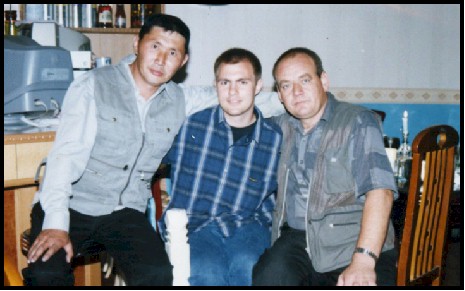
Buyat, Englishman and White Russian
Such scenes were momentarily spoiled by a couple of stations serving places inhabited by the type of coal-driven heavy industry that leaves the sight and scent of soot lingering in the air and, most probably, the lungs. Then the ?rrival music?began playing ?ever-ahead in the game of brainwashing its populace, subliminally or otherwise, the Chinese had hit on a winner here, with light-hearted music being piped out several minutes before the train reached its terminus, creating an air of well-being among the passenger base.
Cycling to the Great Lake
After I disembarked in Manzhouli I was less than amused when a junior porter in the luggage collection shed felt the need to do a couple of laps of the warehouse on my mean machine, wearing an inane grin on his oval face for the duration. Once I put a stop to his little antics, the velocipyed, as it would be known in these parts (everyone was to address me in Russian) was mine, as was the town. I was free to cycle down the streets looking at the Siberians who, as Europeans in Asia, seemed so close yet so distant from the folk I knew back home. I had a moment or two to ponder the extraordinary physical metamorphosis that their womenfolk seem pre-programmed to undergo in their thirties: how on earth could such a bulk of the population go from slim and skinny to rather rotund in such a short time-span? Was it really a case of simple "giving up" after marriage, as a Canadian had once told me? Dostoevsky himself notes the "fleeting beauty" of the Russian female, far more short-lived than her European sisters.
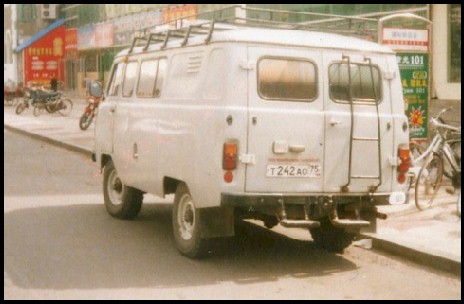
Typical Siberian Transport
The following morning I departed for the lake. It felt good to hit the road, and as I exited the town I came to appreciate just how isolated this place was. The surrounding area was real nomad country; grassland or desert-steppe. There were several lizards keeping me company, and the lazy amphibians didn't for the most part make a particular effort to avoid being run over. Had I really wanted to go on a bike ride, the road that I was now on would take me all the way to the Pacific port of Vladivostok. However, my cycling CV wasn't enough to make me think about pedalling to the Pacific. Yet. Though once upon a time on midwinter's day in Harbin ?home of the International Ice Carving Competition and boasting temperatures of thirty below ?I had thought it would be a good idea to start cycling northbound. Hence I found myself checking into a motel in the middle of nowhere at 2am minus any sensation in my ears. The next morning the ridges at the top of them had crystallised and were exceedingly painful. Whether or not this was first-stage frostbite I am not sure ('but it certainly gave way to similar effects of sunburn, with peeling preceding a ten-day healing process.
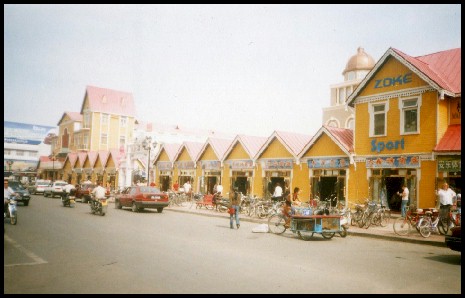
Russian-style shops
Sunburn proved to be more of a problem this time round. The Harbin I had left was dull and grey, and since I had travelled several hundred kilometres north, it hadn't occurred to me to take any sunscreen. I'd know for next time in any case ?by the end of my trip I would have been subjected to a real crash course in Mongolian meteorology. Back to the lake, the guidebooks promised that it would pop up out of the grasslands like an inland sea. Pretty accurate, except something was a little odd about it. I did a double take but my eyes had not deceived me: it was still frozen, despite the fact that the temperature was in the 30s and there was actually a heat haze above the ice. This was all rather bizarre, and I was soon able to investigate more closely, as the downhill towards the local low point (the lake) took me to the shore in a ridiculously short amount of time, barely allowing me to stop to pay the entrance fee to the lakeside area. Goodness only knows what the poor woman at the tiny ticket hut did all day every day, and whether she was there throughout the seasons in case any tourists happen to pass by. Chinese have a remarkable capacity for inactivity ?such passiveness is to be admired on the one hand but is beyond the powers of my comprehension on the other. I for one would soon be in a lunatic asylum if I had to endure a couple of days manning a Chinese ticket booth on an April afternoon in Inner Mongolia. Hell, I once did a day in a Crunchie factory in northern Nottinghamshire, and the excitement caused by an explosion and spillage of a vat of molten synthetic honey and E-numbers was not enough to alleviate the sheer boredom I was faced with. At least I had half a factory to roam around; the ticketeers were stuck in minuscule hut. I made a point to ask people in such jobs how they killed time, if my Chinese ever got good enough.
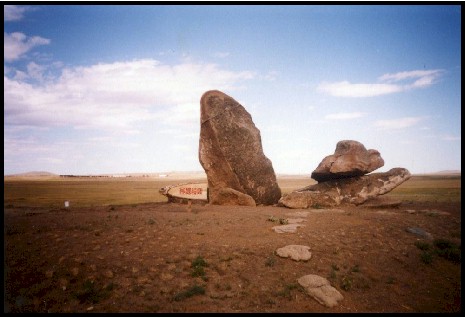
The treeless plains
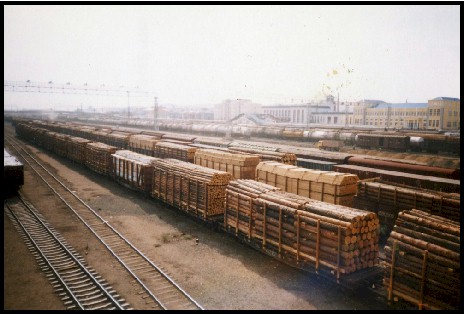
...unlikely center of the timber trade
Off the beaten track
The lakeshore area contained an array of cheap concrete constructions ?restaurants and the like ?hich would no doubt do a roaring trade in the summer. A little further on one was to see a couple of tourist yurts, made out of bricks and breezeblocks rather than sheepskin and felt. After these artificial intrusions, I was well and truly off the beaten track and into an area of pristine wilderness that time and "progress?had left virtually untouched. My map had marked roads and villages alongside the western shore of the lake, but I quickly discovered these to be constructs of a cartographer's imagination: there were jeep tracks and the occasional yurt, but nothing to justify any lines or dots on my chart. This unexpected discovery meant that progress was much slower than I had anticipated, and that I'd have to do without shops until I reached the next settlement, possibly on the southern shore, about 90km away. But it also meant that I got a real hands-on glimpse of the grasslands; the type of experience that couldn't be gained had the path been well-trodden. I also got lost. One would be right to ask how the hell it is possible to do so when following the shore of a bloody big lake, but I can assure you that not only is it highly possible, but also highly probable, given the geography and topography of the area. Allow me to explain. Rather than being a flat plain, as one might imagine prairie-land to be, this steppe-land was a series of undulating planes; some portions merely gently sloping away into the distance, but others would give rise to clusters of contours if anyone ever produced a relief map of the area. And everything looked the same. If a hill decided to situate itself near the shore, then I would be well advised to head inland a bit so as to circumvent this obstruction. However, the hill itself might have other hills emanating from it ?the proverbial pimple on a pimple that teenagers across the world know only too well. And the lakeshore itself is hardly an example of straightness ?so on deviating from it by a kilometre or two, one may in reality have lost it by three or four kilometres, without even knowing it.
So I didn't know where the lake was. That much is easy to explain. Furthermore, my compass was pretty useless. Sure, I could use the earth's magnetic field to determine in which direction the north pole lay, but such information wouldn't be particularly useful to me if I wanted to pinpoint my location, as I had no way of knowing how far north I'd actually travelled. There simply were no reference points from which to take bearings.
Probably the most bizarre effect, however, was that I had lost the ability to tell my up from my down. Before you go thinking that I was delirious from the searing heat (which left me with a nice April sunburn), I don't mean that I tried to cycle on my head or anything foolish like that. I merely mean that I could not distinguish between a plane that was gently rising and one that was gently descending. And how on earth could I know that I didn't know this? It wasn't to do with the ease of cycling, as wicked winds and a sandy surface meant that even on descending stretches gravity didn't offer me a helping hand ?as far as cycling was concerned, it was an uphill slog all the way. What made me aware of this strange phenomenon were the few features in this otherwise empty landscape ?usually herds of sheep or a yurt on the horizon. Such blobs of white had a habit of disappearing behind hills, only to reappear somewhat later, and they remained seemingly forever on the horizon. Sometimes when I thought I was ascending to a local high point, and going to be treated to a grand old view of the country ahead, my sheep and sheepskin tents would suddenly disappear, and other times when I thought I was gently descending into a (strictly topographical) depression, a whole new vista would unfurl itself in front of me, hinting that I must have actually gained a little elevation.
The Mongols
So, for large stretches, I knew not where I was going, only that I should keep on moving and try to push on to a sensible resting place for the night. People were few and far between, but of the Mongols I did see, I can certainly say they seemed a likeable bunch. By and large, the men herded from horseback, but a fair few zoomed around the grasslands on motorbikes. They were all skilled in stone-throwing to keep their herds in check. I saw some of their wives and daughters chipping in with work too ?they were being driven round on the back of a truck after a dung-collecting mission. Such desiccated defecation would be used to fuel their fires; the Mongolian dependency on the sheep was similar to the Native American's relationship with the bison, or the Inuit's and Chuckchi's (those "Eskimos" on the opposite side of the Bering Strait) dependency on the whale. A use was found for everything related to that animal.
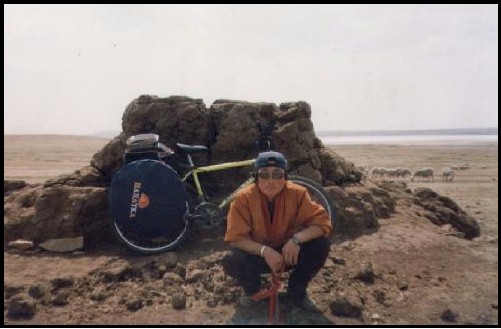
Mongolian herdsman
Unlike the Han Chinese who would point and shout and stare, some of the Mongols, particularly the old, would stand outside their yurt, leaning first their hands and then their heavily-weathered faces on staffs but remaining motionless and seemingly unmoved when they saw a foreign cyclist battling the elements in their neck of the woods. It was often I who initiated interactions, with a wave and a ni hao (I knew not of the Mongolian sain bain uu at this stage), but invariably got ignored. Except, that is, by their dogs, who would take up chase, drooling and salivating, and as insane as the Englishman to be going as far and as fast as they did in the midday sun. I exaggerate not: one chase lasted for at least 3km, which is one of the best cardio workouts I've ever had. In the future I'd make a note to come armed with a dazer ?a nice little stick that gives such beasts an electric shock, which would put me in position to fight back. I'd still probably resort to flight though. Rabies isn't the nicest of ailments to acquire.
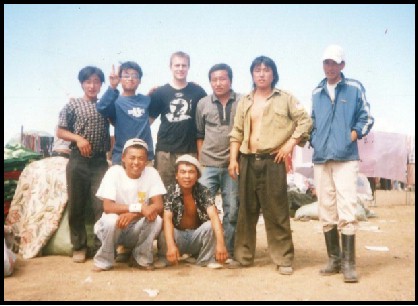
Mongol horde
Passing one canine-free yurt at close quarters I was invited inside and, having not eaten for most of the day, was more than willing to take up the owner's kind offer of noodles. And thus I saw the interior of these amazing portable homes. They are big enough to house a family, but it is a family without possessions. A trunk at the rear probably held clothes and heirlooms, but the nomadic knick-knacks were by and large 100% practical. Beds. Quilts. And I mean the type of blankets that can be snuggled under in a Siberian winter. Cooking pots. The dung box to fuel the fire. The metal pipe that serves as a chimney and extracts the smoke from the living area. Some beautiful carpets hanging on the wall. Those all-important wooden support beams that you'd lean on at your peril. But perhaps the most fascinating thing that I discovered inside his abode was the knowledge that I wasn't the first foreigner arriving on bike-back to have stepped inside his yurt. He told me that he'd previously encountered a German bloke and an Italian girl travelling together, who'd made this trip after spending time studying at Inner Mongolia University. I made a mental note of that hitherto unheard of educational establishment - if it harboured the type of folk who did that type of thing it could hold serious possibilities for me down the line.
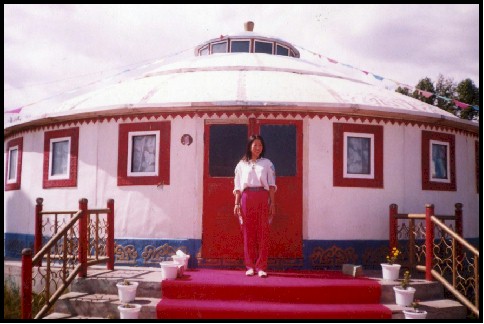
Mongolian restaurant
Melting Day
I declined the offer to stay the night, as it was early afternoon and I wanted to put in some more hours so as to put me in striking distance of civilization ?and supplies ?in the morning. When dusk was threatening to put a stop to cycling, I headed in the general direction of the lake, aiming to drop down off high ground and sleep on the lakeshore under the stars. However, it took me an hour to reach the puddle that I had always assumed was just over the next hill, and some strong winds and a sharp temperature drop accompanied the failing light. Maybe sleeping under the stars wouldn't be so comfortable after all, but I wasn't exactly spoilt for choice at this point in time. Maybe the gusts would die down after a bit, so I planned to rest for a while and assess the situation.
The winds were getting fiercer and the plains offered as much shelter during the night as they had shade during the day: none at all. I donned all of my spare clothes except a T-shirt, which I tied between a small bush and my bike as a windbreak. Then I dug myself a cosy little hole in the pebbly shore, and proceeded to lie face down in it, head well away from the winds that were whipping themselves up in a frenzied manner, with no signs of subsiding. The sounds that went with them were otherworldly too, with whistling as well as the usual howling. It was freezing cold and I was shivering but I knew I'd just have to wait it out. My windbreak was flapping away wildly and I wished I had dug myself deeper in, but I was loathe to raise my head for even a few seconds, what with the strength of the wind and the dust it would pepper me with.
As time passed the storm got even more intense, and I tried to occupy my mind with trivialities. I was unable to get a wink of sleep throughout the night and continued shivering. However, the pre-dawn light brought a bit of a calm, and I thought it was high time to stop my ostrich impression and get back on my bike. You can imagine my surprise when I looked at the lake and in place of the sheet of ice of yesterday was a turbulent body of water being pushed around by the wind. On one level the melting had happened overnight; the wind must have really attacked the ice and broken it and buffeted it, thus accounting for the concert of whistles and groans during the night. But on another level it hadn't happened overnight at all ?the previous day the temperatures had been in the 30s, and they must have been significantly above freezing for a substantial period of time, meaning that the sun's rays had gradually been working to reduce the thickness of ice until it was at a stage where the wind could finish the job. Although I felt cold, tired, hungry and thirsty, I also felt mightily privileged to have been there on this once-a-year occasion of Melting Day. It was also May Day ?the folk back in Britain would be enjoying a Bank Holiday on account that this was the first day of the fifth month. I'd known before about the temperature ranges of this part of the world over the course of twelve months, but I'd been oblivious to the fact that such extremes could be experienced in a 12-hour period. Mongolia certainly had my respect.
Fences and poles
A few star jumps followed by several quick k's got the better of the muscle spasms that constitute shivering, and the temperature rose pretty quickly with the dawning of the new day, making me shed several layers. I was to find myself as unprepared to face the heat as I had been the cold ?by the end of the day I would be more burnt than a befreckled Scot who fell asleep in the sun. More Mongols were to be seen, but they weren't particularly helpful when it came to providing me with kilometre estimates (but then, why should they be?) That I had a long way to go was all I really knew. They pointed westwards towards a good road, but I knew from my map that this highway was a long way from the shore, and I might as well look into finishing what I'd started, deviating only to stock up on supplies.
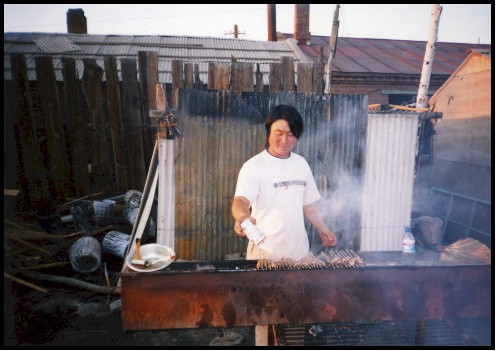
Mongolian barbeque
Whilst still by the lake I came upon an object pretty peculiar in these parts ?the humble fence. The Mongolian relationship with nature seems to be built on the principle "we'll take care of you; you'll take care of us, OK?" and they have been historically loathe to build permanent structures. Foundations, walls and the like are seen to damage the integrity of nature, hence structures were by and large temporary and could be removed with no evidence of having ever been there. Land was unowned and unownable; you were welcome to take from it what you needed, as long as you gave back to it and didn't upset its balance or rhythms. Hence the fence was as out of place here as a McDonald's would have been. It was a barbed wire one at that, and seemed to run all the way to the lakeshore and as far inland as I could see. However, I spied a gate and thought nothing of intruding through some land that had no right to be enclosed in the first place. The owner thought otherwise. After about ten minutes?progress through his huge ranch, he chugged up to me on a tractor and rather aggressively declared: "this is my home."
"Beautiful,?I assured him. Whether he expected me to take a multi-kilometre detour or whether he wanted to extract a fee from this once-in-a-blue-moon trespasser, I never determined. He was less scary than the dogs of the day before and could be easily outpedalled.
Once I had exited his territory I spied a series of telegraph poles on the horizon. These proved to be a good visual aid and were as good a course as any to follow. In fact, following them was far better than wandering aimlessly as they would actually be leading somewhere. And the type of somewhere that had electricity really would be Somewhere out here. A police jeep passed me, kicking up clouds of dust as it bounced over the rough terrain. It stopped and the occupants asked to see my passport. After glancing at it and being mystified by its contents, the kindly policemen gave me a couple of bottles of water. They were all ethnic Mongolians and seemed to be doing the rounds of the herders. Maybe they doubled up as postmen. Perhaps not. Their kilometre estimate to the nearest town was in the range of something manageable in the remainder of the day, so I battled on with renewed energy.
Stopped in my tracks
However, the settlement I was heading for appeared just to be a tourist restaurant on an otherwise uninhabited section of the lakeshore. The saving grace was that it was served by a gravel road, which I used for a bit before realising that the chippings were about as amenable to cycling as the bare steppe, and that this driveway would only serve to extend my journey. Instead I used the two features (road + restaurant) as a rare reference point and set my compass so as to make a beeline for the town. And how did I know the town would actually bother existing? Well, the tarmac-ed road that the Mongols had guided me to must have actually served something. As must the electricity cables. I sighted the town after a couple of hours, only for it to do that annoying trick of staying the same size on the horizon, never bothering to get any bigger or closer. When I eventually rolled up, I thought a trip to a shop or a restaurant would be the order of the day. The local constabulary put an end to those plans ?as I passed their police station they summoned me to accompany them. Therein ended my freedom.
The officer in question was ethnically Mongolian and sported a huge mole on his right cheek. I know about the difficulties of moles and shaving, specifically that a mole will bleed pretty much indefinitely if sliced open by a razor blade, but in my estimation there is an alternative to cultivating a thicket of hairs on such a blemish and allowing them to sprout to two or three inches in length. Scissors might be a solution? Anyway, he had the classic round and weathered face of the Mongolians, and during his "investigation" referred to a Mongolian-Chinese dictionary while I enlisted the help of my Chinese-English wordbook. It didn't take too much language to establish that he wasn't happy with my presence and that I shouldn't have been there at all.
He questioned me about anything and everything, giving our dictionaries a real workout. He went through my bag and, upon discovering my mobile phone, decided it was fair game to call some numbers from my contact list. Undeterred by the lack of battery, he switched SIM cards and then called a couple of random acquaintances. He was really looking to get in touch with my danwei (work unit). I was loathe to let this happen, as I'd be in real trouble back at base if my bosses caught wind of my little mission and, furthermore, had to deal with another police investigation. My green card contained the name and address of my school, and so there was potential for real trouble to brew up. However, a call to Directory Enquiries later and my Mongol captor was no closer to contacting them than before. This owed to the fact that my school had amalgamated with another one and the old site being given the classic dynamite and bulldozer treatment. Furthermore, owing to the superior status of our partner school, upon amalgamation our previous name had got swallowed into an all-but-forgotten subheading. All in all, this left my bosses pretty uncontactable. Which was lucky.
Getting disinfected
Regarding SARS, Inner Mongolia had numerous cases and people were hugely restricted when it came to travelling. He didn't like it that I hadn't had a health check when I came into town, thus he forced me to take a trip to the local clinic. At this point in time, I didn't know that everyone coming in to town was being tested, and thought I was just being hassled because I was foreign (such a phenomenon is not exactly unknown in China). Hence when he stated that "I had to go the hospital because maybe I had fei dian (SARS)", I pointed to a man in the street and said "maybe he has fei dian - maybe he should go to the hospital. Ask him." The police didn't like that. I tried a similar approach with another wanderer, before asking, "why me?" It was becoming apparent that I wasn't going to be given much choice in the matter. Hence I accompanied the copper, him riding his motorbike and me my push-bike. At that point he really couldn't understand my journey; the difficulty of cycling into a headwind on gravel made it a big struggle, which probably wasn't his idea of fun.
At the hospital a lot of dialogue went on between police, doctors and nurses. I was invited into a room where a doctor held a canister of liquid that he wanted to spray over me, presumably some form of disinfectant. Having been through the whole police palaver on an empty stomach, I was understandably not amused at the prospect, and made a face. The doctor proceeded to spray himself, indicating that it was harmless, and I duly consented to being de-loused. A thermometer reading later and my medical examination had ended ?the important thing always seemed to be that I had a stamped piece of paper declaring my temperature to be in the normal range, rather than an assessment of my health showing that everything was OK. Again, we were seeing rules over axioms, just like the curtain in the train compartment, and one could argue it was such a stance that spread the disease as much as any airborne viruses. That, and the misinformation.
People seemed to be pretty polarised with their attitudes to SARS: some were scared stiff and shut themselves away pretty comprehensively during the danger period whereas others didn't give a monkey's about the epidemic. Personally, although the mortality rates looked worryingly high, I wasn't concerned about the disease, as the prognosis was remarkably good if it was nipped in the bud. This wasn't meningitis, where one day you have a bit of a cold, a couple of days later you are admitted to hospital, and three months after that you?e released, albeit minus a limb or two that became uncontrollably infected and had to be amputated. Information from western websites caused me to be cautious, but largely unconcerned. Obviously the Chinese didn't have access to such impartial information, and as such were basing judgments instead on the double-headed dragon of governmental propaganda ?which kept changing its tune ?and the good old rumour mill. Back in Harbin, about half of all the foreign students were either from Russia or South Korea, and both of their governments recalled them at about this time, meaning that they were a mere six weeks away from completing their course, yet would be unable to take exams or graduate. Some would face quarantine when repatriated. However, their international classmates would be locked inside the campus for the duration of the disease. Of these, I'm not sure who got the good deal ?probably no-one.
Anyway, once disinfected and in possession of my "passport" (as I referred to my stamped temperature report), the police quickly dispensed of me, finding me a room in an inn and telling me not to leave until the morning, at which time they would put me on a bus back to Manzhouli. When the police had left, I asked the innkeepers where a chemist was via my phrasebook, and it became apparent that while they could speak Chinese, they couldn't read the characters. In the chemist I got some cream for my burnt face and was served by a stunningly beautiful Mongolian girl. Whilst walking back I noted that all the internet cafes had been boarded up ?SARS precautions were being taken seriously in this neck of the woods.
Mission half completed!
At a small shop I stocked up on some noodles and sausages and the like that would serve to counteract my hunger. Who am I kidding? Biscuits were half of my mission statement and constituted about 75% of my purchases. I also felt the need to nab a mystery box, about half the size of a pack of playing cards, which had pictures of the American flag at one end and the Iraqi one at the other. Someone was profiting from the war, but what on earth were the contents? At only 1.5 yuan a pop, it was a decent investment, and so I got a couple. The shopkeeper had to open the cellophane wrapping which encased the consignment of boxes ?none of the locals had felt the need to make a purchase yet. Back in my inn, I discovered it was a set of tiny plastic toy soldiers.
In the morning the policeman rolled up about an hour later than our agreed time and escorted me to the bus station, where my bike was stowed on the roof-rack while I was bundled into the bus heading back to Manzhouli. En route there were several roadblocks, and by that I mean earthy barriers that forced traffic to risk overturning as they precariously disembarked the raised platform that the highway was built on. At several of these there were medical personnel milling about but we didn't get stopped by any of them. We did get stopped by Border Security though, and it was at that point that I realised the town was not only subject to restrictions based on SARS but also classified as being an off-limit border zone due to the proximity of Outer Mongolia. I began to realise why the police had been so surprised to see me ?that was a fair few roadblocks I'd unwittingly circumvented. Maybe I hadn't completed my circumnavigation, but I'd got almost half way there and knew what extra equipment was needed were I ever to have another bash.
At Manzhouli Bus Station my temperature was taken by another Mongolian girl, who relegated the chemist into the second most attractive female I've ever seen. I received another "passport", and cycled to the train station, with the plan of heading back to Harbin. No through tickets were to be had but I could get as far as Hailar, three hours down the line, so I thought I might as well go there for the sake of variety, and then connect to Harbin. However, I wasn't very welcome in Hailar ?when I walked into a hotel with my sunburnt foreign face, the receptionist proceeded to cover her face and dive under her desk to save herself from my germs. Such junior school antics were repeated in three other establishments ?well, minus the dramatics, but the result was the same: move on, matey, we aint gunna help you here.
The temperature test
So I lingered as little as possible in this unfriendly town, before catching a train back to Harbin. My fellow passengers found amusement in the fact that one bloke scored a 38 on the temperature test, when 37.5 was the cut-off point. This time round the stick-it-under-your-armpit thermometers had been replaced by laser beams that medical staff would point at your forehead, giving instant readings. The protocol for those who passed the test was pretty straightforward; rubber-stamp their forms. As for those who failed?allow their mates to mock them for five minute periods before coming back to take another reading, hoping that the passenger in question had bothered cooling down in the interim.
Everything seemed geared up to producing paperwork saying that things were A-OK, that serious steps were being taken, and that everything was under control. There appeared to be little thought about the procedures for those who failed the temperature tests (this man failed for about three hours but said he was OK and eventually got a stamp, presumably because it was the most hassle-free solution). As we disembarked the train, a whole army of differently ranked medical officials in different uniforms were waiting for us, observing as we passed through newly installed walk-through thermometers (looking exactly like airport metal detectors). I was amazed that such a massive mobilization of equipment and personnel had been effected during the few days since I left the very same station. Money was certainly being spent, but whether it was doing any good was another matter altogether.
As I battled through the scrum of medical men and taxi touts into the drabness of the industrial city, I knew that after I'd served my time as a teacher, I'd head back to the hinterlands and live the simple life for a while. And where better place to do so than Inner Mongolia? Little-known, mysterious and intriguing, it is a land that warranted further investigation. I'd survived my own temperature test, and resolved to head back to the grasslands when the SARS hoo-hah had cooled off.
Bike China Adventures, Inc.
Home | Guided Bike Tours | Testimonials |
| Photos | Bicycle Travelogues
| Products | Info |
Contact Us
Copyright © Bike China Adventures, Inc., 1998-2012. All rights reserved.

